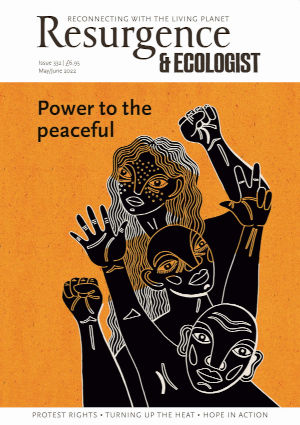When I chanced upon this book a couple of months ago, I wasn’t sure whether I would enjoy it. After all, I had only started reading poetry very recently. Poetry on Nature? Yes! Poetry on climate change and the pandemic? This idea brought with it some hesitation at first. Would it be too dark, depressing? Would it bring back haunting memories of the months I spent recovering from ‘long Covid’? Yet, as an avid environmentalist and voracious reader, I was excited by the fact that a contemporary Indian literary figure, Sudeep Sen, had responded to the burning issue of climate change. I flipped through the book. On the inside back cover were these words by the poet Czesław Miłosz: “My generation was lost. Cities too. And nations. But all this a little later. Meanwhile, in the window, a swallow.” As I looked outside my own window to see a bright blue kingfisher perched atop a branch, I began to smile. I was ready to read.
I peeled away the dust jacket to reveal a sunny yellow cloth cover embossed with silver letters – a cover that made me want to run my hands over it slowly as I contemplated the meaning of the words that lay within. Inside, the pages are thick and grainy with an off-white tone – unbleached paper that absorbs some light, bringing about a feeling of nostalgia as I read on. This book is unusual in that Sen, a poet, journalist, graphic designer and photographer, led the entire production from the cover design to the choice of paper. These aspects seem to bring attention to tactility, a quality that is becoming lost in the times of the pandemic, a subject that forms a key part of the book’s contents.
In the prologue, Sen quotes Japanese film-maker and artist Akira Kurosawa: “The role of the artist is not to look away.” And Sen made it a point to not look away. He created a book out of his deep, consistent observation of his surroundings – the trees, the sky, the people, Nature. I see a sort of chronological progression in the book: first came climate change and then came the pandemic. Through his works in the climate change section, Sen combines his knowledge of the world, gained by extensive travel and reading, with scenes from his home city, Delhi. The reality and inevitability of climate change then gives way to the dark heaviness of the pandemic. The section ‘Contagion’ highlights the larger problem, that the pandemic might only be a symptom of climate change.
Sen talks in this book about how humans and our capitalism have ruined the planet. He talks about the hardships of marginalised communities and the privilege of the rich. He talks about disease, death and recovery. He observes how Nature came to life while the rest of the world slowed. Most of all, this book told me that heartache and hope belong together. Sen quotes Stanley Kubrick: “However vast the darkness, we must supply our own light.” This is the note the book leaves us on – the beauty of light and hope. For me, this multi-genre work of poetry, prose and photography has beautifully captured agony, urgency and action through the author’s words, distilling the emotions of millions across the world into this compilation.
Rashi Goel is an independent consultant and journalist based in India. You can find her on Twitter. @RashiGoel9






